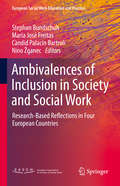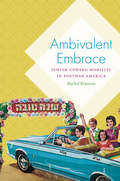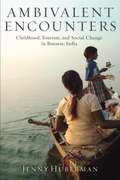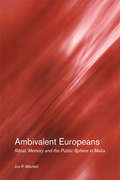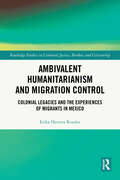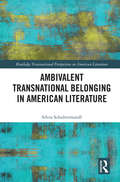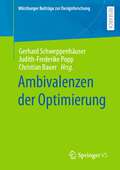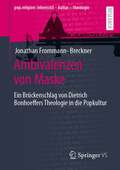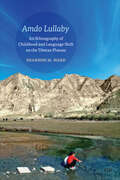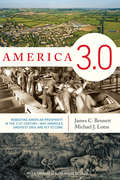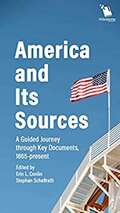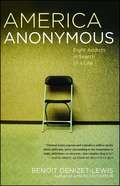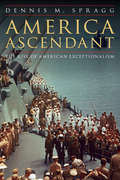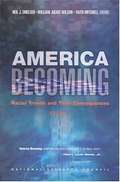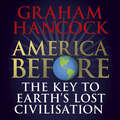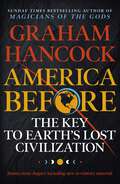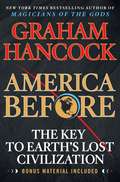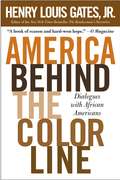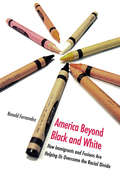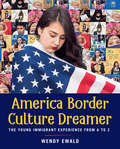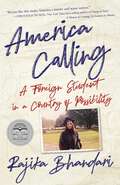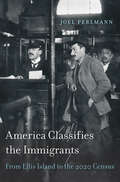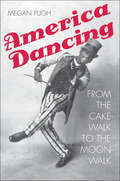- Table View
- List View
Ambivalences of Inclusion in Society and Social Work: Research-Based Reflections in Four European Countries (European Social Work Education and Practice)
by Stephan Bundschuh Maria José Freitas Càndid Palacín Bartrolí Nino ŽganecThis book represents the work of the European Research Network: Inclusive Society and the Role of Social Work, which comprises researchers from Barcelona, Spain; Koblenz, Germany; Maastricht, The Netherlands; and Zagreb, Croatia. The authors present research results and reflections from these four different European countries to provide a comprehensive introduction and discussion of the ambivalences of inclusive processes in society and social work. The development towards an inclusive society is a subject of ongoing discussion in Europe. How the subject is addressed, through an examination of political and social characteristics, differs significantly by country. Each country-specific chapter includes evidence-based reflections on inclusive society and the role of social work: In The Netherlands, there is evidence of a top-down process implementing inclusive social policy and social work principles through the self-proclaimed ‘participation society’. In Spain, the process to inclusion is accompanied by the third sector often replacing governmental responsibilities, namely through the bottom-up activities of non-governmental organizations in social work. In Croatia, inclusion is a state initiative in transitioning society and an academic approach to deinstitutionalising social work. In Germany, inclusion is discussed in social systems theory and the reform of school systems. In the migration discourse it was introduced as a less-loaded alternative to integration. Ambivalences of Inclusion in Society and Social Work: Research-Based Reflections in Four European Countries is a useful resource for learners, teachers, practitioners, and researchers in social work, as well as those who have an interest in social policy, social welfare, and sociology.
Ambivalent Childhoods: Speculative Futures and the Psychic Life of the Child
by Jacob BreslowExplores childhood in relation to blackness, transfeminism, queerness, and deportability to interrogate what &“the child&” makes possibleThe concept of childhood contains many contested and ambivalent meanings that have extraordinary implications, particularly for those staking their claim for belonging and justice on the wish for inclusion within it. In Ambivalent Childhoods, Jacob Breslow examines contemporary U.S. social justice movements (including Black Lives Matter, transfeminism, queer youth activism, and antideportation movements) to discover and reveal how childhood operates within and against them.Ambivalent Childhoods brings together critical race, trans, feminist, queer, critical migration, and psychoanalytic theories to explore the role of childhood in shaping and challenging the disposability of young black life, the steadfastness of the gender binary, the queer life of children&’s desires, and the precarious status of migrants. Through an engagement with&“the psychic life of the child&” that combines theoretical discussions of childhood, blackness, transfeminism, and deportability with critical readings of films, narrative, images, and social justice movements, Breslow demonstrates how childhood requires sustained attention as a complex and ambivalent site for contesting the workings of power, not only for the young. Ambivalent Childhoods is a forward-thinking and intersectional analysis of how childhood affects activism, national belonging, and the violence directed against queer, trans, and racialized people.
Ambivalent Embrace: Jewish Upward Mobility in Postwar America
by Rachel KransonThis new cultural history of Jewish life and identity in the United States after World War II focuses on the process of upward mobility. Rachel Kranson challenges the common notion that most American Jews unambivalently celebrated their generally strong growth in economic status and social acceptance during the booming postwar era. In fact, a significant number of Jewish religious, artistic, and intellectual leaders worried about the ascent of large numbers of Jews into the American middle class. Kranson reveals that many Jews were deeply concerned that their lives—affected by rapidly changing political pressures, gender roles, and religious practices—were becoming dangerously disconnected from authentic Jewish values. She uncovers how Jewish leaders delivered jeremiads that warned affluent Jews of hypocrisy and associated "good" Jews with poverty, even at times romanticizing life in America's immigrant slums and Europe's impoverished shtetls. Jewish leaders, while not trying to hinder economic development, thus cemented an ongoing identification with the Jewish heritage of poverty and marginality as a crucial element in an American Jewish ethos.
Ambivalent Encounters
by Jenny HubermanJenny Huberman provides an ethnographic study of encounters between western tourists and the children who work as unlicensed peddlers and guides along the riverfront city of Banaras, India. She examines how and why these children elicit such powerful reactions from western tourists and locals in their community as well as how the children themselves experience their work and render it meaningful. Ambivalent Encounters brings together scholarship on the anthropology of childhood, tourism, consumption, and exchange to ask why children emerge as objects of the international tourist gaze; what role they play in representing socio-economic change; how children are valued and devalued; why they elicit anxieties, fantasies, and debates; and what these tourist encounters teach us more generally about the nature of human interaction. It examines the role of gender in mediating experiences of social change--girls are praised by locals for participating constructively in the informal tourist economy while boys are accused of deviant behavior. Huberman is interested equally in the children's and adults' perspectives; her own experiences as a western visitor and researcher provide an intriguing entry into her interpretations.
Ambivalent Europeans: Ritual, Memory and the Public Sphere in Malta
by Jon P. MitchellAmbivalent Europeans examines the implications of living on the fringes of Europe. In Malta, public debate is dominated by the question of Europe, both at a policy level - whether or not to join the EU - and at the level of national identity - whether or not the Maltese are 'European'. Jon Mitchell identifies a profound ambivalence towards Europe, and also more broadly to the key processes of 'modernisation'. He traces this tendency through a number of key areas of social life - gender, the family, community, politics, religion and ritual.
Ambivalent Humanitarianism and Migration Control: Colonial legacies and the Experiences of Migrants in Mexico (Routledge Studies in Criminal Justice, Borders and Citizenship)
by Erika Herrera RosalesAmbivalent Humanitarianism and Migration Control explores the complex relationship between migrants and local aid organisations. These organisations have become indisputably relevant and highly regarded as allies to Northern Central American migrants trying to reach the United States. Thus, this book examines the implications of humanitarian actors in migration governance and bordering practices, which have serious and long-lasting effects on the lives of migrants.Through an in-depth research in Mexico, this book suggests that humanitarian organisations are ambivalent institutions because they intend to help and support individuals while reinforcing social and power inequalities. It explores the narratives, roles, and practices of humanitarian workers, and, at the same time, addresses migrants’ resistance. From an interdisciplinary approach that employs critical humanitarian perspectives, post/decolonial theories, and criminological studies, this study provides a comprehensive analysis of migration governance and migrants’ agency.A highly informative, insightful, and engaging read, Ambivalent Humanitarianism and Migration Control will appeal to students, scholars, and researchers in migration studies, border studies, sociology, and critical criminology. Given its international scope, it also will be of interest to academics, practitioners, and people in Latin America, the United States, the UK, Europe, and beyond.
Ambivalent Transnational Belonging in American Literature (Routledge Transnational Perspectives on American Literature)
by Silvia SchultermandlAmbivalent Transnational Belonging in American Literature discusses the extent to which transnational concepts of identity and community are cast within nationalist frameworks. It analyzes how the different narrative perspectives in texts by Olaudah Equiano, Catharina Maria Sedgwick, Henry James, Jamaica Kincaid, and Mohsin Hamid shape protagonists’ complex transnational subjectivities, which exist between or outside national frameworks but are nevertheless interpellated through the nation-state and through particular myths about liberal, sentimental, or cosmopolitan subjects. The notion of ambivalent transnational belonging yields insights into the affective appeal of the transnational as a category of analysis, as an aesthetic experience, and as an idea of belonging. This means bringing the transnational into conversation with the aesthetic and the affective so we may fully address the new conceptual challenges faced by literary studies due to the transnational turn in American studies.
Ambivalenzen der Optimierung (Würzburger Beiträge zur Designforschung)
by Gerhard Schweppenhäuser Christian Bauer Judith-Frederike PoppInnovation, Wachstum und Optimierung sind normative Grundlagen des Designs, der Technologie, der Wirtschaft, der Gesellschaft und der Kultur. Unter dem Vorzeichen der Digitalisierung zeichnen sich neue ›Optima‹ ab, in denen Menschen zum Bestandteil entgrenzter Netzwerkstrukturen werden. Die in Würzburg entstandenen Aufsätze des vorliegenden Bandes gehen ambivalenten Aspekten dieser Entwicklung mit wissenschaftlichen und gestalterischen Methoden nach. Der Gastbeitrag geht der Frage nach, was dialektisches Denken in Diskurs und Praxis der Gestaltung bedeutet.
Ambivalenzen von Maske: Ein Brückenschlag von Dietrich Bonhoeffers Theologie in die Popkultur (pop.religion: lebensstil – kultur – theologie)
by Jonathan Frommann-BrecknerEine Maske kann theologisch als ein Phänomen der Ambivalenz verstanden werden. Einerseits kann sie etwas zeigen, indem sie etwas anderes verdeckt. Andererseits kann sie etwas zeigen, was sonst verdeckt bleiben würde. Diese Unterscheidung lässt sich auf maskenähnliche Aspekte des Verhaltens von Menschen übertragen. Menschliches Verhalten kann zum Beispiel zwischen Zeigen und Verdecken, Aufrichtigkeit und Verstellung, Selbstausdruck und Selbstschutz oder Enthüllung und Verhüllung oszillieren. Vor diesem Hintergrund lässt sich eine Idee davon entwickeln, was es bedeuten kann, hinter eine Maske zu sehen oder etwas in einer Maske zu sehen. Dieser phänomenologische Fokus dient als Lektürebrille für Dietrich Bonhoeffers Werk – schwerpunktmäßig für Texte aus den Lebensphasen seiner Konspiration und Haft, in denen eine Theologie der Maske ausgemacht werden kann. Diese Theologie eignet sich als Aufhänger, Vergleichspunkt und Interpretament für die Auseinandersetzung mit Popkultur. Ein solcher theologischer Brückenschlag wird in Bezug auf Quentin Tarantinos Film Inglourious Basterds sowie Selfies im Rahmen von Social Media erprobt.
Amdo Lullaby: An Ethnography of Childhood and Language Shift on the Tibetan Plateau (Anthropological Horizons)
by Shannon WardIn Amdo, a region of eastern Tibet incorporated into mainland China, young children are being raised in a time of social change. In the first decades of the twenty-first century, Chinese state development policies are catalysing rural to urban migration, consolidating schooling in urban centres, and leading Tibetan farmers and nomads to give up their traditional livelihoods. As a result, children face increasing pressure to adopt the state’s official language of Mandarin. Amdo Lullaby charts the contrasting language socialization trajectories of rural and urban children from one extended family, who are native speakers of a Tibetan language known locally as “Farmer Talk.” By integrating a fine-grained analysis of everyday conversations and oral history interviews, linguistic anthropologist Shannon M. Ward examines the forms of migration and resulting language contact that contribute to Farmer Talk’s unique grammatical structures, and that shape Amdo Tibetan children’s language choices. This analysis reveals that young children are not passively abandoning their mother tongue for standard Mandarin, but instead are reformatting traditional Amdo Tibetan cultural associations among language, place, and kinship as they build their peer relationships in everyday play.
America 3.0
by James C. Bennett Michael J. LotusAmerica's greatest days are yet to come. We are in a painful transition period. Our government is crushingly expensive, failing at its basic functions, and unable to keep its promises. It does not work and it cannot continue as it is. But the inevitable end of big government does not mean the end of America. It only means the end of one phase of American life. America is poised to enter a new era of freedom and prosperity. The cultural roots of the American people go back at least fifteen centuries, and make us individualistic, enterprising, and liberty-loving. The Founding generation of the United States lived in a world of family farms and small businesses, America 1.0. This world faded away and was replaced by an industrialized world of big cities, big business, big labor unions and big government, America 2.0. Now America 2.0 is outdated and crumbling, while America 3.0 is struggling to be born. This new world will bring immense productivity, rapid technological progress, greater scope for individual and family-scale autonomy, and a leaner and strictly limited government. America has made one major transition already, and industrial America became an economic colossus. We are now making a new transition, which will surprise many Americans, and astonish the world.
America And Its Sources: A Guided Journey Through Key Documents, 1865-present
by Erin ConlinAmerica and Its Sources: A Guided Journey through Key Documents, 1865-present is an innovative sourcebook designed for non-majors, ESL students, and other students who struggle with large amounts of reading. Through 14 focused units, the editors guide students from important post-1865 documents to major sources from contemporary America. Each unit includes a brief introduction to the era, unit questions, 5 expertly edited primary sources with overviews and guiding questions, and a unit review. This affordable sourcebook offers students the essential tools they need to examine and analyze primary sources without overwhelming them with lengthy and difficult texts.
America Anonymous: Eight Addicts in Search of a Life
by Benoit Denizet-LewisAMERICA ANONYMOUS is the unforgettable story of eight men and women struggling with addictions. For nearly three years acclaimed journalist Benoit Denizet-Lewis immersed himself in their lives as they battled drug and alcohol abuse, overeating, and compulsive gambling and sexuality. Alternating with their stories is Denizet-Lewis's candid account of his own recovery from sexual addiction and his compelling examination of our culture of addiction, where we obsessively search for new and innovative ways to escape the reality of the present moment and make ourselves "feel better."Addiction is arguably this country's biggest public-health crisis, triggering and exacerbating many of our most pressing social problems, from crime to child abuse and neglect. But while cancer and AIDS survivors have taken to the streets and to the halls of Congress demanding to be heard, millions of addicts talk only to one another in the confines of anonymous Twelve Step meetings. Through the riveting stories in this book, Denizet-Lewis shines a spotlight on addiction and breaks through the shame and denial that still shape our understanding of it--and hamper our ability to treat it.As these eight addicts stumble, fall, and try again to make a different and better life, Denizet-Lewis records their struggles, and his own, with honesty and empathy.to make a different and better life, Denizet-Lewis records their struggles -- and his own -- with honesty and empathy.
America Ascendant: The Rise of American Exceptionalism
by Dennis M. SpraggAmerica Ascendant vividly portrays the global crisis that brought the media and the government into an alliance that changed the course of American and world history. President Franklin D. Roosevelt organized an extraordinary partnership between the U.S. government and America&’s media outlets to communicate to the reluctant and isolationist American public the nature of the threat that World War II posed to the nation and the world. The coalition&’s aim was to promote the concept of American exceptionalism and use it to galvanize the public for the government&’s cause.America Ascendant details the efforts of many prominent individuals and officials to harness the collective energy of the nation and guide the United States throughout World War II then describes its aftermath and the Cold War period. Dennis M. Spragg demonstrates how the news and entertainment of American broadcasters such as David Sarnoff, William Paley, and Elmer Davis helped rally the American people to fashion a new liberal democratic order to stop the global spread of Communism. This media-government alliance, however, was not achieved without difficulty. Spragg highlights the competing visions and personalities that clashed, as media and government leaders tried to develop the paradigm that ultimately shifted American cultural and political thought. Throughout this searching history he sheds light on the underappreciated coordination between the media and the government to establish a liberal democratic world order and demonstrates why American exceptionalism still matters.
America Becoming: Racial Trends and Their Consequences
by National Research CouncilThe 20th Century has been marked by enormous change in terms of how we define race. In large part, we have thrown out the antiquated notions of the 1800s, giving way to a more realistic, sociocultural view of the world. The United States is, perhaps more than any other industrialized country, distinguished by the size and diversity of its racial and ethnic minority populations. Current trends promise that these features will endure. Fifty years from now, there will most likely be no single majority group in the United States. How will we fare as a nation when race-based issues such as immigration, job opportunities, and affirmative action are already so contentious today?In America Becoming, leading scholars and commentators explore past and current trends among African Americans, Hispanics, Asian Americans, and Native Americans in the context of a white majority. This volume presents the most up-to-date findings and analysis on racial and social dynamics, with recommendations for ongoing research. It examines compelling issues in the field of race relations, including: Race and ethnicity in criminal justice. Demographic and social trends for Hispanics, Asian Americans, and Native Americans. Trends in minority-owned businesses. Wealth, welfare, and racial stratification. Residential segregation and the meaning of "neighborhood." Disparities in educational test scores among races and ethnicities. Health and development for minority children, adolescents, and adults. Race and ethnicity in the labor market, including the role of minorities in America's military. Immigration and the dynamics of race and ethnicity. The changing meaning of race. Changing racial attitudes.This collection of papers, compiled and edited by distinguished leaders in the behavioral and social sciences, represents the most current literature in the field. Volume 1 covers demographic trends, immigration, racial attitudes, and the geography of opportunity. Volume 2 deals with the criminal justice system, the labor market, welfare, and health trends, Both books will be of great interest to educators, scholars, researchers, students, social scientists, and policymakers.
America Before: A new investigation into the mysteries of the human past by the bestselling author of Fingerprints of the Gods and Magicians of the Gods
by Graham Hancock***THE SUNDAY TIMES TOP TEN BESTSELLER***'Hancock's books provide a fascinating, alternative version of prehistory. America Before, detailed and wide-ranging, turns what was myth and legend into a new story of the past.' Daily MailWas an advanced civilization lost to history in the global cataclysm that ended the last Ice Age? Graham Hancock, the internationally bestselling author, has made it his life's work to find out -- and in America Before, he draws on the latest archaeological and DNA evidence to bring his quest to a stunning conclusion.We've been taught that North and South America were empty of humans until around 13,000 years ago - amongst the last great landmasses on earth to have been settled by our ancestors. But new discoveries have radically reshaped this long-established picture and we know now that the Americas were first peopled more than 130,000 years ago - many tens of thousands of years before human settlements became established elsewhere.Hancock's research takes us on a series of journeys and encounters with the scientists responsible for the recent extraordinary breakthroughs. In the process, from the Mississippi Valley to the Amazon rainforest, he reveals that ancient 'New World' cultures share a legacy of advanced scientific knowledge and sophisticated spiritual beliefs with supposedly unconnected 'Old World' cultures. Have archaeologists focussed for too long only on the 'Old World' in their search for the origins of civilization while failing to consider the revolutionary possibility that those origins might in fact be found in the 'New World'?America Before: The Key to Earth's Lost Civilisation is the culmination of everything that millions of people have loved in Hancock's body of work over the past decades, namely a mind-dilating exploration of the mysteries of the past, amazing archaeological discoveries and profound implications for how we lead our lives today.(P)2019 Hodder & Stoughton Limited
America Before: A new investigation into the mysteries of the human past by the bestselling author of Fingerprints of the Gods and Magicians of the Gods
by Graham Hancock***THE SUNDAY TIMES TOP TEN BESTSELLER***'Hancock's books provide a fascinating, alternative version of prehistory. America Before, detailed and wide-ranging, turns what was myth and legend into a new story of the past.' Daily MailWas an advanced civilization lost to history in the global cataclysm that ended the last Ice Age? Graham Hancock, the internationally bestselling author, has made it his life's work to find out -- and in America Before, he draws on the latest archaeological and DNA evidence to bring his quest to a stunning conclusion.We've been taught that North and South America were empty of humans until around 13,000 years ago - amongst the last great landmasses on earth to have been settled by our ancestors. But new discoveries have radically reshaped this long-established picture and we know now that the Americas were first peopled more than 130,000 years ago - many tens of thousands of years before human settlements became established elsewhere.Hancock's research takes us on a series of journeys and encounters with the scientists responsible for the recent extraordinary breakthroughs. In the process, from the Mississippi Valley to the Amazon rainforest, he reveals that ancient 'New World' cultures share a legacy of advanced scientific knowledge and sophisticated spiritual beliefs with supposedly unconnected 'Old World' cultures. Have archaeologists focussed for too long only on the 'Old World' in their search for the origins of civilization while failing to consider the revolutionary possibility that those origins might in fact be found in the 'New World'?America Before: The Key to Earth's Lost Civilisation is the culmination of everything that millions of readers have loved in Hancock's body of work over the past decades, namely a mind-dilating exploration of the mysteries of the past, amazing archaeological discoveries and profound implications for how we lead our lives today.
America Before: A new investigation into the mysteries of the human past by the bestselling author of Fingerprints of the Gods and Magicians of the Gods
by Graham Hancock***THE SUNDAY TIMES TOP TEN BESTSELLER***'Hancock's books provide a fascinating, alternative version of prehistory. America Before, detailed and wide-ranging, turns what was myth and legend into a new story of the past.' Daily MailWas an advanced civilization lost to history in the global cataclysm that ended the last Ice Age? Graham Hancock, the internationally bestselling author, has made it his life's work to find out -- and in America Before, he draws on the latest archaeological and DNA evidence to bring his quest to a stunning conclusion.We've been taught that North and South America were empty of humans until around 13,000 years ago - amongst the last great landmasses on earth to have been settled by our ancestors. But new discoveries have radically reshaped this long-established picture and we know now that the Americas were first peopled more than 130,000 years ago - many tens of thousands of years before human settlements became established elsewhere.Hancock's research takes us on a series of journeys and encounters with the scientists responsible for the recent extraordinary breakthroughs. In the process, from the Mississippi Valley to the Amazon rainforest, he reveals that ancient 'New World' cultures share a legacy of advanced scientific knowledge and sophisticated spiritual beliefs with supposedly unconnected 'Old World' cultures. Have archaeologists focussed for too long only on the 'Old World' in their search for the origins of civilization while failing to consider the revolutionary possibility that those origins might in fact be found in the 'New World'?America Before: The Key to Earth's Lost Civilisation is the culmination of everything that millions of readers have loved in Hancock's body of work over the past decades, namely a mind-dilating exploration of the mysteries of the past, amazing archaeological discoveries and profound implications for how we lead our lives today.
America Before: The Key to Earth's Lost Civilization
by Graham HancockWas an advanced civilization lost to history in the global cataclysm that ended the last Ice Age? Graham Hancock, the internationally bestselling author, has made it his life's work to find out--and in America Before, he draws on the latest archaeological and DNA evidence to bring his quest to a stunning conclusion. <P><P>We’ve been taught that North and South America were empty of humans until around 13,000 years ago – amongst the last great landmasses on earth to have been settled by our ancestors. But new discoveries have radically reshaped this long-established picture and we know now that the Americas were first peopled more than 130,000 years ago – many tens of thousands of years before human settlements became established elsewhere. <P><P>Hancock's research takes us on a series of journeys and encounters with the scientists responsible for the recent extraordinary breakthroughs. In the process, from the Mississippi Valley to the Amazon rainforest, he reveals that ancient "New World" cultures share a legacy of advanced scientific knowledge and sophisticated spiritual beliefs with supposedly unconnected "Old World" cultures. Have archaeologists focused for too long only on the "Old World" in their search for the origins of civilization while failing to consider the revolutionary possibility that those origins might in fact be found in the "New World"? <P><P>America Before: The Key to Earth's Lost Civilization is the culmination of everything that millions of readers have loved in Hancock's body of work over the past decades, namely a mind-dilating exploration of the mysteries of the past, amazing archaeological discoveries and profound implications for how we lead our lives today. <P><b>A New York Times Bestseller</b>
America Behind the Color Line: Dialogues with African Americans
by Henry Louis Gates Jr.Gates, the eminent Harvard scholar and author, traveled around the US to find out why and how black America has split into what he sees as two distinct communities: one privileged and one disenfranchised. The book, the companion to a PBS television series of the same name, comprises about 40 essays focusing on individuals (both prominent and obscure) who inhabit four spheres: the "ebony towers" of academia, government, and business; the American South, whose black population increased by almost 3.6 million in the 1990s; black Hollywood; and Chicago's South Side, where a parallel world of extreme black poverty persists. Gates' interviewees talk about race, class, and what it means to be African-American in the 21st century. Annotation ©2004 Book News, Inc., Portland, OR (booknews.com)
America Beyond Black and White: How Immigrants and Fusions Are Helping Us Overcome the Racial Divide
by Ronald Fernandez"This book is both powerful and important. Powerful for the testimony it provides from Americans of many different (and even mixed races) about their experiences. And important because there is a racial revolution underway that will upend race as we know it during the twenty-first century. ” -John Kenneth White, Catholic University of America America Beyond Black and Whiteis a call for a new way of imagining race in America. For the first time in U. S. history, the black-white dichotomy that has historically defined race and ethnicity is being challenged, not by a small minority, but by the fastest-growing and arguably most vocal segment of the increasingly diverse American population-Mexicans, Chinese, Japanese, Koreans, Indians, Arabs, and many more-who are breaking down and recreating the very definitions of race. Drawing on interviews with hundreds of Americans who don’t fit conventional black/white categories, the author invites us to empathize with these "doubles” and to understand why they may represent our best chance to throw off the strictures of the black/white dichotomy. The revolution is already underway, as newcomers and mixed-race "fusions” refuse to engage in the prevailing Anglo- Protestant culture. Americans face two choices: understand why these individuals think as they do, or face a future that continues to define us by what divides us rather than by what unites us.
America Border Culture Dreamer: The Young Immigrant Experience from A to Z
by Wendy EwaldFirst- and second-generation immigrants to the US from all around the world collaborate with renowned photographer Wendy Ewald to create a stunning, surprising catalog of their experiences from A to Z. In a unique collaboration with photographer and educator Wendy Ewald, eighteen immigrant teenagers create an alphabet defining their experiences in pictures and words. Wendy helped the teenagers pose for and design the photographs, interviewing them along the way about their own journeys and perspectives.America Border Culture Dreamer presents Wendy and the students' poignant and powerful images and definitions along with their personal stories of change, hardship, and hope. Created in a collaboration with Al-Bustan Seeds of Culture, this book casts a new light on the crucial, under-heard voices of teenage immigrants themselves, making a vital contribution to the timely national conversation about immigration in America.
America Calling: A Foreign Student in a Country of Possibility
by Rajika BhandariGrowing up in middle-class India, Rajika Bhandari has seen generations of her family look westward, where an American education means status and success. But she resists the lure of America because those who left never return—they all become flies trapped in honey in a land of opportunity. As a young woman, however, she finds herself heading to a US university to study, following her heart and a relationship. When that relationship ends and she fails in her attempt to move back to India as a foreign-educated woman, she returns to the US and finds herself in a job where the personal is political and professional: she is immersed in the lives of international students who come to America from over 200 countries, the universities that attract them, and the tangled web of immigration that a student must navigate. An unflinching and insightful narrative that explores the global appeal of a Made in America education that is a bridge to America’s successful past and to its future, America Calling is both a deeply personal story of Bhandari’s search for her place and voice, and an incisive analysis of America’s relationship with the rest of the world through the most powerful tool of diplomacy: education. At a time of growing nationalism, a turning inward, and fear of the “other,” America Calling is ultimately a call to action to keep America’s borders—and minds—open.
America Classifies the Immigrants: From Ellis Island to the 2020 Census
by Joel PerlmannWhen more than twenty million immigrants arrived in the United States between 1880 and 1920, the government attempted to classify them according to prevailing ideas about race and nationality. But this proved hard to do. Ideas about racial or national difference were slippery, contested, and yet consequential—were “Hebrews” a “race,” a “religion,” or a “people”? As Joel Perlmann shows, a self-appointed pair of officials created the government’s 1897 List of Races and Peoples, which shaped exclusionary immigration laws, the wording of the U.S. Census, and federal studies that informed social policy. Its categories served to maintain old divisions and establish new ones. <P><P> Across the five decades ending in the 1920s, American immigration policy built increasingly upon the belief that some groups of immigrants were desirable, others not. Perlmann traces how the debates over this policy institutionalized race distinctions—between whites and nonwhites, but also among whites—in immigration laws that lasted four decades. <P><P> Despite a gradual shift among social scientists from “race” to “ethnic group” after the 1920s, the diffusion of this key concept among government officials and the public remained limited until the end of the 1960s. Taking up dramatic changes to racial and ethnic classification since then, America Classifies the Immigrants concentrates on three crucial reforms to the American Census: the introduction of Hispanic origin and ancestry (1980), the recognition of mixed racial origins (2000), and a rethinking of the connections between race and ethnic group (proposed for 2020).
America Dancing
by Megan PughThe history of American dance reflects the nation's tangled culture. Dancers from wildly different backgrounds learned, imitated, and stole from one another. Audiences everywhere embraced the result as deeply American. Using the stories of tapper Bill "Bojangles" Robinson, Ginger Rogers and Fred Astaire, ballet and Broadway choreographer Agnes de Mille, choreographer Paul Taylor, and Michael Jackson, Megan Pugh shows how freedom--that nebulous, contested American ideal--emerges as a genre-defining aesthetic. In Pugh's account, ballerinas mingle with slumming thrill-seekers, and hoedowns show up on elite opera house stages. Steps invented by slaves on antebellum plantations captivate the British royalty and the Parisian avant-garde. Dances were better boundary crossers than their dancers, however, and the issues of race and class that haunt everyday life shadow American dance as well. Deftly narrated, America Dancing demonstrates the centrality of dance in American art, life, and identity, taking us to watershed moments when the nation worked out a sense of itself through public movement.
